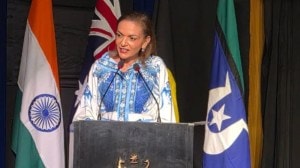A Chhattisgarh district that set out to address mental health issues sees results
To begin with, community health workers, the first point of contact for patients, were asked to find out if there were people showing signs of mental health issues
 Health workers conducting a door-to-door survey; and (right) Durg District Magistrate Pushpendra Meena (Express)
Health workers conducting a door-to-door survey; and (right) Durg District Magistrate Pushpendra Meena (Express)In 2023, the district administration in Chhattisgarh’s Durg district decided to address on a war footing cases of mental health illness that often go unnoticed. And thus started Samvedana (sensing), a campaign in which health workers conducted door-to-door surveys, screened patients, and identified thousands of people either suffering from mental health issues or in need of physiotherapy.
Before the campaign started, community health workers and 22 doctors from the district received online and in-person training from the National Institute of Mental Health and Neuro-Sciences (NIMHANS).
To begin with, community health workers, the first point of contact for patients, were asked to find out if there were people showing signs of mental health issues. This was followed by a door-to-door survey by rural health organisers (RHOs), who had to fill a Google form with ten questions, which helped ascertain if a person needed treatment. Awareness was also created through visits to schools, markets and fairs.
The initiative bore fruit. As per government data, over 3 lakh households were covered in the campaign, and around 3,000 patients were identified. Treatment was provided to 2,721 patients, and 1,376 received follow-up care.
While mental health issues such as depression and insomnia were higher in urban areas, rural areas threw up cases of developmental issues and substance abuse. As many as 3,884 people in need of physiotherapy were also identified and treated, including 2,900 at home and another 800-odd at hospitals.
Durg District Magistrate Pushpendra Meena has been recognised for the initiative in the Excellence in Governance Awards 2024, organised by The Indian Express, under the Healthcare category.
“The biggest challenge was the stigma around mental health issues. Staff had to be trained to identify them. The volunteers did a wonderful job, and we reached 100% saturation. A girl suffering from schizophrenia was identified and helped. We identified people who had tried to die by suicide. We brought these issues into the mainstream. There is a lack of awareness; many individuals think this is just how they’re born. But that’s not true,” he said.
Deepak Kshatriya, a rural medical assistant, explained the process: “As part of the survey, we asked them some questions. For example, are you facing difficulties in getting proper sleep, is there a loss of appetite, are you losing interest in work, have there been drastic changes in your thought process, etc. If the RHOs find a person who they believe is showing mental health problems, they inform us. We screen the patient and ascertain if they are suffering from any issue. We counsel them and, if needed, provide medicines and do a follow-up.”
He gave the example of a teenage boy who suffered from depression due to bullying in his hostel. “He was quiet and kept aloof. We counselled him, and now his condition is stable.”
“We also got patients with suicidal tendencies stemming out of family problems,” said former district program manager for National Health Mission, Padmakar Shinde.
The initiative also made medicines and doctors more accessible. “Earlier, to refill medicines, patients came to the district, but now they can just avail of it from the public health centre,” said Shinde.
“Even those roaming around on the roads due to mental illness were screened and put in hospital for treatment. Juveniles caught in conflict and kept at correction homes were also screened,” said Dr Ashish Sharma, the Khairagarh Chief Medical Health Officer who also worked on the initiative.
One of the RHOs, Rakesh Sarwa, surveyed 600 homes and identified six cases. “Earlier, our understanding of mental health issues was limited. We are now in a better position to handle such cases. But such campaigns must be run every year,” he said.







